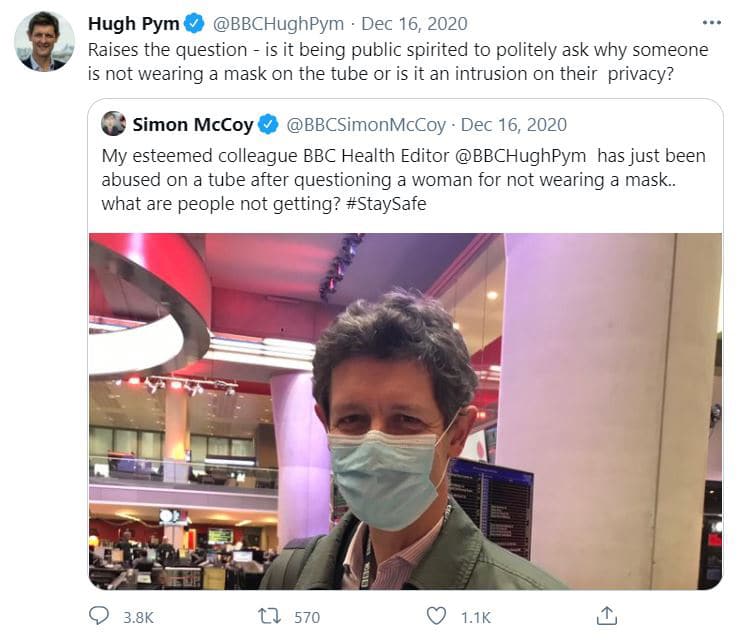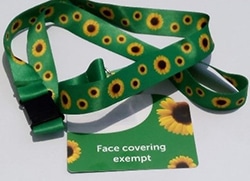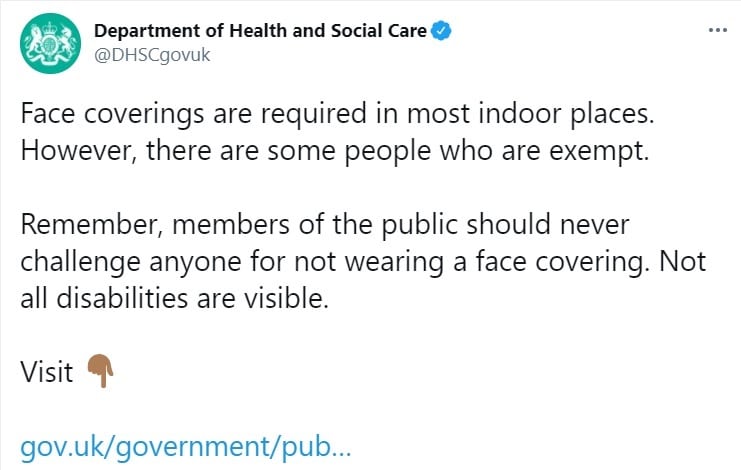Is it OK to ask why someone is not wearing a face mask?
Last month, BBC journalist Simon McCoy tweeted a picture of his colleague, BBC Health Editor Hugh Pym, saying that Mr Pym had “just been abused on a tube after questioning a woman for not wearing a mask”. Mr McCoy asked “what are people not getting? #StaySafe.” Mr Pym retweeted the message, saying: “Raises the question – is it being public spirited to politely ask why someone is not wearing a mask on the tube or is it an intrusion on their privacy?”

The posts divided opinion. Some people supported what they believed to be a safety-conscious and likely well-intentioned attempt by Mr Pym to not only promote compliance with the law, but protect himself and others from the health risks posed by an unmasked fellow passenger. Others pointed out that Mr Pym’s actions were potentially intrusive, and that the passenger may have had a disability or health condition that meant they were exempt. Some commented that Mr Pym’s actions amounted to discrimination.
The debate gave voice to an internal dilemma that many of us may have experienced. In shops, on buses or trains, almost all of us have seen people not wearing a face mask. Our desire not to make assumptions battles with our sense of civic duty. Is it right to say something? And what about members of staff in shops or train stations – are the rules different for them?
The story also prompted many people who are exempt, including those with disabilities, to share their experiences of being repeatedly challenged and even abused for not wearing a mask. Can this ever amount to discrimination?
The Laws on Face Masks
The Regulations on wearing face coverings on public transport came into force on 15 June 2020. Similar regulations for ‘relevant places’ (like shops and railway stations) came into force on 24 July 2020. The regulations require everyone going into a relevant place or using public transport to wear a face covering, unless they have a reasonable excuse.
The list of reasonable excuses includes people who cannot put on, wear or remove a face covering without severe distress, or because of a physical or mental health condition, or a disability. It also includes people who are travelling with somebody who relies on lip-reading to communicate, or someone who is travelling to avoid injury or escape a risk of harm so does not have their face covering with them.
Facemask exemptions
There are a significant number of conditions or situations that fall within these exemptions. For example, autism can cause sensory difficulties that make a person over-sensitive to touch, making wearing anything on the face intolerable. Some people with lung conditions will find that face masks increase their sense of breathlessness to the extent they cannot wear one. Rape Crisis UK has stated that some survivors of rape had their mouths or noses covered, or were choked or smothered, as part of the abuse and violence they experienced. Covering their face and nose now can trigger flashbacks, panic attacks and severe anxiety.
A number of charities, such as the British Lung Foundation and the Oxfordshire Sexual Abuse & Rape Crisis Centre, have issued helpful guidance as to how people experiencing difficulties might successfully wear a face covering, for example by wearing one for very short periods initially or trying different materials. The British Lung Foundation has also given reassurance that face masks do not decrease the oxygen levels reaching the wearer.
However some people will still find that despite trying these methods, they are unable to wear a face covering. It’s important to remember that most of the relevant health conditions, disabilities or situations will be invisible to the naked eye.
Do people exempt from wearing a mask have to show proof?
 The law does not require anybody who is exempt from wearing a face mask to carry proof with them of the reason for their exemption.
The law does not require anybody who is exempt from wearing a face mask to carry proof with them of the reason for their exemption.
There is also no legal requirement for people who are exempt to wear a badge or lanyard. The government has clarified this in their Covid-19 Safer Travel Guidance.
Of course, given the serious public health issues involved and the level of concern many people feel, it can be very helpful for people who are exempt to wear a badge or lanyard. It provides a visible indicator without requiring the person to divulge any further information. There are several different types, including blue badges and lanyards issued by TfL (similar to the ‘baby on board’ badges) and the Hidden Disability Sunflower badge and lanyard pictured above. It is advisable for members of the public to familiarise themselves with these so that they are not overlooked.
Is it discriminatory to challenge a person not wearing a face mask?
The regulations specify that there are only certain people who can direct others to wear or remove face coverings, or deny people entry to relevant places or services because of a lack of face covering. These include police officers and TfL staff.
However the power has limits. There is no legal requirement for people who are exempt to provide proof of their exemption; verbal confirmation should be sufficient. If a customer is wearing an exemption badge or lanyard, there should be no need for staff or police to challenge them at all.
TfL and the police must act in a non-discriminatory manner in line with the Equality Act 2010. Even though they have the power to enforce the face covering regulations, if they inappropriately challenge a disabled person regarding a lack of face covering, become abusive, demand evidence of exemption or impose any other requirement beyond verbal confirmation (such as insisting a person should wear a lanyard) this could amount to discrimination on the grounds of disability. Hodge Jones & Allen have in the past few months been approached by numerous individuals who believe they have been treated inappropriately and discriminated against for not wearing a face mask. Each one reports having felt publicly humiliated by being confronted in public and having to state their disability in a public setting, generally being told by the person who has confronted them “but you don’t look disabled”, which only adds to their distress.
It was concerning to hear the Chair of the Metropolitan Police Federation telling LBC recently that under new plans for police to get tougher on face mask enforcement, people claiming to be exempt from wearing masks will need to provide proof to officers when challenged. This practice could be found to be indirectly discriminatory against people with disabilities, since it will likely place people with disabilities who are exempt at a particular disadvantage compared with the rest of the population.
So, what of Mr Pym and the lady he challenged? The Equality Act 2010 does not apply to exchanges between two private citizens, so even if the unmasked passenger had had a disability, Mr Pym could not be found to have discriminated against her. However, this should not be interpreted as a pass for private citizens to challenge each other in public. The regulations name specific people (such as police officers and TfL staff) who are tasked with enforcement, and the Department of Health and Social Care has confirmed they do not wish for members of the public to question each other regarding why they are not wearing a face mask. Upon sharing updated guidance regarding facemasks on 4 December 2020, the Department of Health and Social Care tweeted:

It is also important to remember that whilst the Equality Act may not apply to exchanges between two private citizens, other laws certainly do. In some certain circumstances, repeated challenges regarding a lack of face mask could amount to harassment, or other criminal offences if the challenge becomes abusive.
Any challenge or question, no matter how politely it is expressed, might be the fifth, sixth, or one hundredth time a person with a disability or traumatic past has been approached since the regulations came into force. They may be experiencing significant anxiety in public spaces. Ultimately we need to be mindful of the many reasons people cannot wear a mask before challenging someone, and likely to stay quiet, even if we are just trying to be public spirited and to keep ourselves and others safe.


